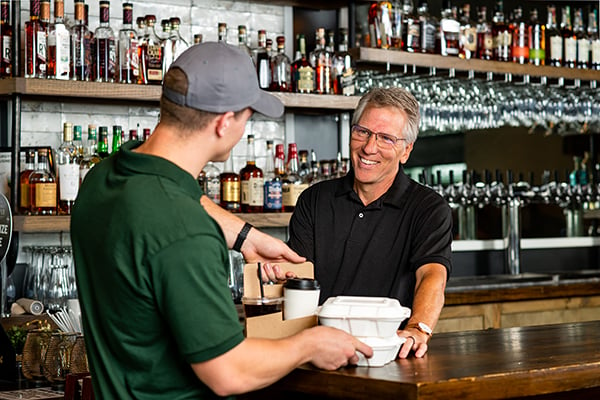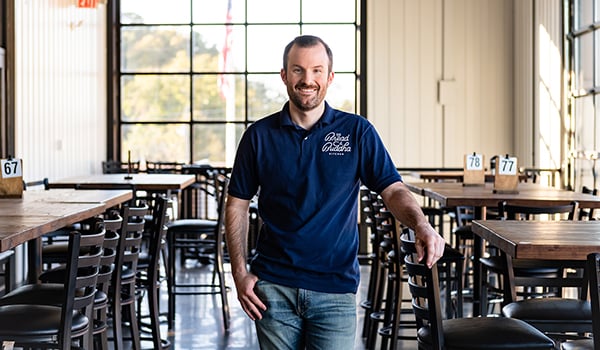Whether your restaurant looks extravagant from the inside out or if you have a 5-star menu, it doesn’t matter if you don’t have excellent customer service along with it. Having good restaurant customer service is arguably the most critical aspect of running a successful business. It’s an industry that requires reliability in order to give customers a reason to come back.
Furthermore, your most loyal customers will quickly boost your reputation by sharing their positive experience with their friends, family, and colleagues! In this blog, we’re examining how a restaurant’s customer service is a crucial element that can make or break an establishment’s success.
Why a Restaurant’s Customer Service Matters
The restaurant industry is competitive and there’s no shortage of places to eat in a majority of places. However, each restaurant is different, including the quality of their customer service. It takes extra time, effort, and resources to deliver a remarkable customer experience each time patrons visit your restaurant. Even though it’s a challenge, it’s going to help you stand out and reinforce the positive qualities of your brand.
Good customer service encourages positive recommendations through word of mouth. However, with most people searching online for reviews, customer service encourages that too! For many people, a quick glance at online reviews before visiting your restaurant can make or break their decision to stop by your business. As a result, your restaurant customer service is a first impression before they even set foot inside of your establishment. Their customer experience begins by them knowing what they are getting each time they visit.
Beyond serving delicious food, creating a memorable and positive dining experience is crucial for attracting and retaining customers. Here are a few more key reasons why restaurant customer service is essential to your customer experience and business.
- Great customer service helps build customer loyalty and encourages repeat business.
- Positive dining experiences lead to word-of-mouth recommendations, attracting new customers.
- Repeat customers contribute to steady revenue and tend to spend more than new customers.
- Personalization and emotional connections through your restaurant customer service strengthen customer relationships.
- Providing excellent customer service is a crucial factor in the success and longevity of a restaurant.
- Good customer service creates a competitive advantage and enhances the restaurant’s reputation.
- Online reviews and ratings heavily influence consumer decision-making, making excellent customer service crucial for managing your online presence.
- Outstanding customer service differentiates a restaurant from its competitors.
- Good customer service ensures that customer expectations are met and exceeded.
- Providing excellent customer service creates a positive brand image and fosters a memorable dining experience.
In the end, your restaurant customer service strategies must be on point in order to create the best experience for your customers.

Handle Feedback
Respecting the opinions of your customers and hearing their voice is the first essential key to good restaurant customer service. Your customers want to resonate and connect with your brand. They do this by expressing how your restaurant makes them feel.
Maybe the special Mother’s Day food items were a hit and customers loved the menu. Maybe Happy Hour deals are the reason why employees across the street are regularly meeting up together at your restaurant. This is positive feedback where you and your staff should be open to customer suggestions and ideas to improve customer service experience. You could even consider asking open-ended questions in social media captions or opening a suggestions page on your website for more engagement.
On the flip side, your staff has to be able to handle negative feedback and customer complaints. Something is bound to go wrong in the fast-paced environment of a restaurant. The essential part here is to acknowledge your mistakes and make it right for the customer.
Handling feedback effectively involves not only acknowledgment of an issue, but also taking appropriate action. Here are some actionable tips to help better customer service when handling feedback:
Investigate and take action
Gather all the necessary information related to the feedback. Speak with staff members involved, review any available records or documentation, and ensure you have a comprehensive understanding of the situation. Once you have identified the root cause of the issue, take the necessary steps to address it. This may involve retraining staff, implementing new protocols, or making changes to existing procedures. Communicate any improvements or changes to customers who provided feedback.
Follow up
Provide closure and follow up with the customer who provided the feedback. Let them know what steps you have taken to address the issue and express your gratitude for their input. Invite the customer to revisit your restaurant and experience the improvements firsthand. Provide them with an incentive, such as a discount or complimentary item, to demonstrate your commitment to their satisfaction and create good customer service.
Learn from customer feedback and improve customer service
Look for patterns or recurring themes in the feedback received. This can help identify areas of improvement that may require a more comprehensive approach or ongoing attention. Incorporate feedback into training to enhance staff training programs. Focus on areas where improvement is needed and provide guidance and resources to help staff members deliver exceptional customer service.
Handling feedback to help provide excellent customer service requires an open and receptive approach. It is important to actively encourage customers to provide feedback through various channels and maintain an open mindset when receiving constructive criticism. Timely responses to feedback, both positive and negative, demonstrate that their opinions are valued and that their concerns are taken seriously. Responding with professionalism, empathy, and understanding helps to address customer issues effectively.
Taking appropriate action by investigating the matter, implementing necessary changes, and following up with customers provides closure and shows gratitude for their input. By analyzing feedback trends and incorporating them into staff training programs, restaurants can continuously improve their good customer service and enhance the overall dining experience.

Showing Gratitude is Crucial to Excellent Customer Service in Restaurants
Showing your customers appreciation for their business is important for customer service, but it’s often overlooked. The restaurant business moves fast, with lots of establishments focused on flipping tables and making the sale. But how many customers have a decent experience yet don’t feel valued? Your staff should practice gratitude towards customers by asking if they’ve ever visited your restaurant before. It opens the door for a warm welcome if they are a first-time customer and builds an emotional connection. Furthermore, your servers can walk them through the menu, specials, and the general layout of your establishment.
It wouldn’t be about loyalty if you don’t thank your existing customers too, right? Your regular customers have a better understanding of your brand and are probably more engaged with your restaurant. They follow you on social media, sign up for email newsletters, and register for that new rewards program you’ve introduced. Here’s your chance to appreciate and reward loyal customers. For example, create discounts for your customer’s birthday and offer them promotions. Invite them to tastings or holiday events with exclusive benefits. Get creative and show your gratitude to your customers!
Gratitude is a powerful element that can elevate the customer service experience at restaurants. It goes beyond the basic transaction and creates a genuine connection between the restaurant and its patrons. Here’s why gratitude is essential and how it can be incorporated into good customer service:
- Expressing gratitude shows customers that their support and patronage are valued and appreciated. Thanking customers for choosing your restaurant creates a positive impression and fosters a sense of loyalty for satisfied customers.
- Cultivating a positive atmosphere helps create a warm and welcoming vibe within the restaurant. When staff members genuinely appreciate customers, it sets the tone for a positive dining experience and contributes to a pleasant ambiance in your restaurant customer service experience.
- When gratitude is embedded in customer service, it enhances the overall dining experience. Simple gestures like a sincere thank you, personalized notes or messages, or small tokens of appreciation can leave a lasting impression on customers.
- Demonstrating gratitude helps build strong relationships with customers. Going the extra mile to express appreciation can create a lasting connection, making customers feel valued and more likely to return. When customers feel appreciated and valued, they are more likely to share their positive experiences with others. This can lead to positive word-of-mouth recommendations and online reviews, attracting new customers to your restaurant.
- Gratitude is not only for customers but also for the restaurant’s staff. Recognizing and appreciating the efforts of employees who provide exceptional customer service boosts morale and fosters a positive work environment. Happy employees are more engaged and motivated to deliver outstanding service.
By incorporating gratitude into customer service, restaurants can create a positive and welcoming environment, strengthen customer relationships, and encourage loyalty. Cultivating a culture of gratitude benefits both customers and staff, leading to a more enjoyable dining experience and long-term success.

Attentiveness
Your restaurant should be attentive to your customers no matter what. Sometimes unpredictable things happen in the restaurant industry, but you should try to minimize the impact that it has on your customer service. People are generally understanding if you show that you care and communicate. Maybe a customer customized their burger and your server wrote it down incorrectly. Alternatively, perhaps the bar is packed, which is backing up drink orders at the tables. Be attentive, read their body language, and let them know what is happening behind the scenes before correcting the issue.
Tiny details matter even if there isn’t anything wrong at the moment. Train your staff on the small things that take minimal effort but go a long way. For instance, servers could bring extra napkins or wet wipes paired with a messy appetizer such as nachos or wings. Servers could also refill water glasses or plastic cups on the spot instead of asking, going back, and finally refilling. As a customer service essential, being attentive is yet another expression of showing your customers that you care.
To incorporate attentiveness into customer service, comprehensive training is essential. Staff members should be equipped with effective listening skills, the ability to anticipate customer needs, and empowered to make decisions that prioritize customer satisfaction. Greeting and welcoming customers upon arrival sets a positive tone, while active engagement and friendly conversation create personal connections. Observing and anticipating customer needs, providing timely and responsive service, and actively seeking feedback for continuous improvement are key components of an attentive customer service approach.
Attentiveness is a crucial customer service essential in the restaurant industry. It involves being fully present, responsive, and proactive in addressing customer needs. By prioritizing attentiveness, restaurants can create a positive and personalized experience that leaves a lasting impression. This leads to enhanced customer satisfaction, fosters loyalty, and contributes to the long-term success of the establishment. Attentiveness allows staff members to anticipate and meet customer needs, establish personal connections, and ensure timely service and operational efficiency. By doing so, they create a customer-centric environment that exceeds expectations and encourages customer loyalty and positive word-of-mouth recommendations.
Your Restaurant Customer Service
Excellent customer service is crucial for the success of restaurants, going beyond merely serving delicious food. It involves creating an unforgettable experience, fostering customer loyalty, leveraging customer feedback, and distinguishing your establishment from competitors. By incorporating gratitude, attentiveness, and other key elements to provide excellent customer service, restaurants can elevate the overall dining experience and cultivate lasting relationships with patrons.
To excel in customer service, restaurants should prioritize staff training, empower employees, and foster a customer-centric culture. Continuous improvement, driven by customer comments and even customer complaints, allows for ongoing enhancements in all aspects of customer service. By embracing these customer service essentials—gratitude, attentiveness, and more—restaurants can set themselves apart, attract new customers through positive word-of-mouth and online reviews, and solidify their reputation for exceptional dining experiences. Exceptional customer service serves as the backbone of a thriving restaurant, paving the way for long-term success and ensuring customers keep coming back for more.

Searching for tools and solutions for your growing business?
YBC Plus is a service that provides sourcing and distribution for your custom printed food service products and merchandise. Whereas Your Brand Cafe helps you design and create branded products that build awareness for your business, YBC Plus helps you supply multiple store locations with these products through an efficient and convenient centralized network. It’s the next step in our process of helping independent businesses grow and prosper! Click here for a free consultation.
